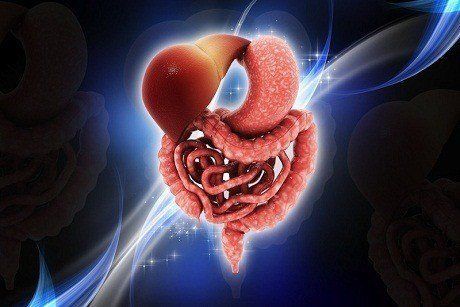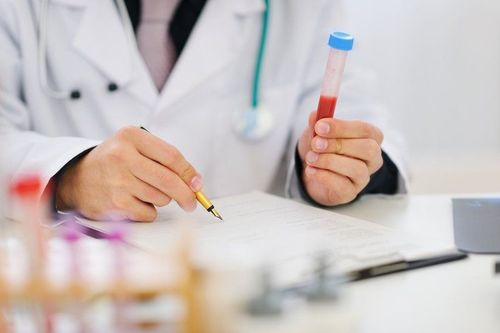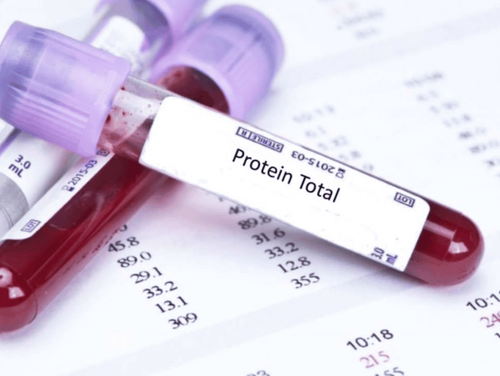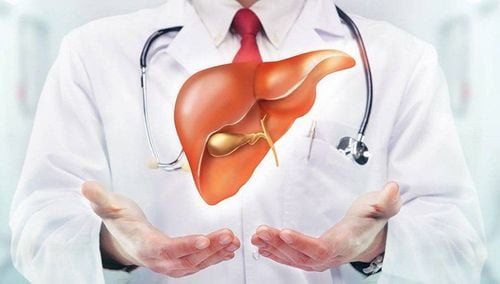This is an automatically translated article.
The albumin/globulin ratio in the test is used to assess the activity of liver function. Some diseases will affect to change Albumin or Globulin, so the ratio of these two indicators reflects the condition and function of the liver.1. What is the Albumin/Globulin ratio?
Protein in the blood consists of two main components: albumin and globulin. Protein plays a very important role in the construction of cells and tissues, and regulates the activities of the body in the role of hormones and enzymes. The total protein test is performed by measuring the amount of albumin and globulin in the blood serum. The albumin/globulin ratio in a total protein test is the ratio of the concentrations of two proteins Albumin and Globulin obtained by direct measurement of blood concentrations.Albumin protein has a small molecular weight composed of many amino acids, containing about half of the total protein found in the blood. Albumin is synthesized mainly in the liver and ensures vital functions of the body such as:
Functions in the process of maintaining plasma oncotic pressure. Ensure the transport of many substances such as fatty acids, bilirubin or drugs. These substances are bound to albumin and circulate in the blood. Protein globulins are molecules that differ in weight, size, and function. There are three main types of globulin in the body: alpha globulin, beta globulin and gamma globulin. In it, alpha and beta globulins are synthesized in the liver. Gamma globulin, also known as immunoglobulin, is produced by B lymphocytes in response to antigenic stimulation. Functions of protein globulins include:
Participate in maintaining acid-base balance Participate in the body's inflammatory response Produce antibodies to perform the body's protective function Participate in the process fibrinolysis and coagulation regulation

Tỷ lệ của hai chỉ số albumin và globulin phản ánh tình trạng và chức năng của gan
2. Significance of the Albumin/Globulin ratio in the test
The Albumin/Globulin ratio in the total protein test will help assess the general health of the patient, and this index may suggest liver and kidney related diseases and assess liver function. . The albumin/globulin ratio in patients will usually be in the 1-1.5 range. However, the concentration of Albumin, Globulin as well as the A/G ratio will vary depending on the disease being acquired. Based on the ratio of Albumin / Globulin for the doctor to find out the cause of the disease.A number of factors can affect the test results including:
During the blood collection test, the time to tie the garo for too long can increase albumin. Diet high in protein The patient has used some drugs that reduce protein, eg: estrogen, oral contraceptives,... When the test results show that the Albumin/Globulin ratio increases or decreases, it may be possible. suggest some pathology. Specifically:
Decreased Albumin/Globulin ratio reflects the increase in Globulin production and decrease in Albumin production, which is common in some of the following diseases:
Liver diseases such as cirrhosis, hepatitis,... myeloma Autoimmune diseases Peptic ulcer peptic ulcer Kidney disease: nephrotic syndrome ,. .. The increased Albumin/Globulin ratio reflects the status of immunoglobulins not being produced enough, common in some of the following diseases:
Lymphoma, leukemia. Bone marrow cancer No blood globulin Decreased blood gamma globulin Fasting, fasting.

Nhịn ăn, đói bụng cũng là nguyên nhân gây tăng tỷ lệ Albumin/Globulin
3. When to test the Albumin/Globulin ratio?
Total protein testing is done during routine physical exams. This test is also performed to reflect the nutritional status of the body or to diagnose diseases related to the kidneys, liver and digestive tract diseases,... Besides, when feeling the body If there are unusual symptoms, the patient should also seek medical attention as soon as possible. Some unusual symptoms include:Loss of appetite Suded weight loss Fatigue Nausea and vomiting Eating difficult to digest There are signs of nutritional deficiency Edema feet, hands, face,... In addition, before When performing the test, the patient should note that they should fast for about 8-12 hours before, and should not use alcoholic beverages. Early morning is when the blood components are most stable and will most accurately reflect the patient's health status.
In summary, the Albumin/Globulin ratio in the test helps to assess the general health of the patient and this index may suggest liver or kidney related diseases. Patients can have the test done during general visits. Or when there are unusual signs such as fatigue, loss of appetite, sudden weight loss, etc., the patient should immediately go to a medical facility for diagnosis and assessment of health status.

Ngay khi nhận thấy những biểu hiện bất thường như sụt cân, mệt mỏi,... bạn cần đi khám ngay
Accordingly, the periodic medical examination and the implementation of paraclinical tests will sometimes help to detect abnormalities that the patients themselves cannot detect. From there, people will have an early diagnosis, help treat the disease early, and ensure quality of life later.
Please dial HOTLINE for more information or register for an appointment HERE. Download MyVinmec app to make appointments faster and to manage your bookings easily.













